Insights on Oprah’s show on Haiti – Part 2
Written by Dahla
A viewer’s perspective – Part 2
Another riveting documentary that left me excited about making my dreams a reality for my country. Last night, 3 extraordinary stories were featured in Oprah’s Next chapter and I admired the love that each of these stories exuded for our people, our culture and our artistic talent. Those 3 stories are minuscule in comparison of all the good work currently being done in Haiti by others. However, they can be a catalyst for others to start thinking; to start dreaming; to start having a vision; and to start believing in themselves so they can make a difference, and not to let status, money, or fear prohibit them from doing so.
I love that Oprah was able to capture a diverse range of stories, in the short amount of time that she spent in Haiti. I am certain that if more time was allotted, Oprah would have covered more regions of Haiti, hence more stories. One thing I would hope comes from this, is that access be given to our Haitian journalists to interview foreigners doing work in Haiti, so the Diaspora and local people know more about their work.
There is so much to say about each of those stories that I will only depict the most important elements from my perspective. Vision, Passion, Commitment and Action are underlined in all the 3 stories.
The 1st Story – Ariana
Ariana’s Story – Is a calling to all nonbelievers to truly believe again and let the universe play its course in the things we need to achieve in our lifetime. How could a child of 8 years of age be thinking about Haiti and building an orphanage? Was that her calling? Well, I believe it was her calling and she made it happened along with the support of her parents.
The orphanage that her parents run with her in Haiti, is called Maison Lumiere (the Lighthouse), which cares for approximately 47 girls and boys ranging from age 4 to teens. They have a school, a medical clinic, security, and a transition house (similar to a trade school) for their children. The transition house is for the older children, and they are taught the “savoir vivre” like sewing, woodworking and more. My question is, what happens to those teens if they want a higher education? Could perhaps Maison Lumiere Orphanage fund their education?
What is more appealing is that her parents have adopted 2 more children from Haiti and they made the ultimate sacrifice in leaving their comfort zone in the U.S. to reside in Haiti to achieve Ariana’s dream. IT TAKES COURAGE AND FAITH. How many of us sometimes are afraid to travel overseas or do the ultimate change in our lives just because …………
Oprah had fun chatting with the girls and Ariana’s parents. She adamantly shared with the girls that education is freedom and was proud to give a brief introduction to her school in Africa. The issue of not having access to emergency rooms in Haiti was a detriment to our people, and Oprah stated that most took that system for granted in the U.S.
Ariana’s organization in Haiti is registered as “Child Hope International” and they mostly support their needs through donations and sponsors. In the midst of her conversation with Oprah, she stated that Haitian girls tend to settle for less and seem not to have any dreams. Quite a bold statement, yet one I would firmly disagree with. Most of the Haitian girls I’ve talked to in Haiti have dreams – bigger than their parents’ dreams. What happens is, if they cannot access and/or have the means to achieve those dreams, they reluctantly settle for less. And the settling only happens when they feel pressured by people not giving them a chance, not believing in their vision, or just simply not believing in their potential. However, if given the opportunity, the financial means, and the support, they would in a heartbeat, further their education and shoot for the stars.
Interested in learning more about Ariana, the visionary and about her organization and orphanage, click on the following links:
Ariana’s dream: http://www.easyreadernews.com/1465/arianas-dream/
Website: http://www.childhope.org/work/orphanage/orphanage.html
Facebook: http://www.facebook.com/childhope
Twitter: @childhopeintl
In summary:
Lesson to be learned: Whatever your vision, it is important to find support and stay grounded in your beliefs. Patience and resilience can go a long way. Parents ought to believe and support their children’s endeavors.
What I would do: Take a pen and start writing down your vision and desires for humanity and for yourself. Bring along your children, your parents and friends so they can partake in the same exercise for themselves as well.
The 2nd Story – Magalie Dresse
Magalie Dresse’s Story – Is inspiring and reflects determination and hope. Magalie, a fierce, intelligent Haitian woman is the proud owner of Caribbean Craft located in Port-au-Prince, Haiti. She is a business woman with lots of accolades and extraordinary passion for her people in Haiti. Magalie was named the Digicel Entrepreneur of the year 2010. You can see her resilience and devotion to provide employment, to teach her people and better the economy in Haiti, as the products made by her company are being recognized overseas and sold in stores such as Anthropologie and West Elm. I love her brilliant idea of incorporating a meal service for her employees (as they say no food, no work & no energy!)
After her company was destroyed in the 2010 earthquake, Magalie and her painter husband Joel Dresse did not give up on themselves and their employees. The company is now thriving with about 349 employees ranging from painter, crafter and sculptor. Their “papier maché” products are now a hot commodity. I also admired that training in Caribbean Craft is shared among the employees. For instance, her husband Joel teaches and trains employees on the art of painting and those who master the skill train the new comers. Education and knowledge are passed along, and that’s the way it should be in all the things we do in life.
Her company offers health care, no interest loans to the employees. Oprah called her: “the New Star in Haiti” and truly admired the work she is achieving in Haiti. As you know, Oprah is all about women empowerment, her actions showed both respect and admiration for Magalie Dresse, so much so that when Oprah congratulated her and hugged her, the gesture brought tears to Magalie’s eyes. I would say that running a balanced, profitable company in Haiti with employee benefits while keeping a good reputation is not easy. It demands lots of hustling and love for what you do. I was overjoyed to see Oprah in awe of our Haitian artists and our Haitian arts while touring her company.
Want to know more about Magalie, the entrepreneur, the business woman and about her company, click on the following links:
For information on Caribbean Craft: http://www.facebook.com/Magalie-Noel-Dresse/
Haitian crafts at West Elm: http://blog.westelm.com/2011/11/23/papier-mache/
In summary:
Lesson to be learned: Take action! Overcome your challenges and aim for better things. Find that entrepreneurial spirit inside of you, and let it out. Success comes with hard work and dedication.
What I would do: If you have a vision and want to open a company in Haiti, I would suggest that you research the field, network with those in the field, collaborate with those who can be a mentor to you and certainly define the why, the how and the for whom?
The 3rd Story – Donna Karan
Donna Karan’s Story – A renowned fashion designer who falls head over heels in love with Haiti. I found her interview with Oprah to be genuine but I still question her involvement in the intricate issues of Haiti. Nevertheless, I command her for taking a leap of faith and giving a platform to our Haitian designs overseas. According to Donna, she often travels to Haiti for inspiration and also works with various Haitian artists in terms of developing a production line for their designs. Basically, she is teaching them about customization so the products can be a demand in the market share. This is a great initiative by her, and I truly hope our artists/ designers are being taught in such a way that they can take the reins of her teaching to open their own businesses and make a production line on their own. I believe that they need to know about production line for their own endeavors, and become self sufficient in the long run. I am also aware that there other Haitian designers who give their services free of charge, and travel to Haiti to teach their people, but are silent about their work. The “celebrity” label of Donna Karan, has nonetheless helped brand our artistry with foreigners.
The interview with Oprah took place in the Caribbean Craft showroom in Port-au-Prince, Haiti and I felt it was a perfect setting since the topic was about art and crafts. Oprah even urged her cameramen to purchase some of the Haitian beads for their loved ones. This was exhilarating to me as I have always been proud of the richness of our Haitian culture, and was glad to see us finally getting the recognition for our hard work.
Donna’s love for new artistic ideas channels through her eyes and her conversation. Donna has come a long way as she is very reputable in the fashion industry and well respected by her peers. She stated that philanthropy and commerce are interconnected and that she wants collaboration from others to tackle hotels, medical systems and education in Haiti. This is an aggressive plan and I love it! Why do I love it? Because she is entitled to see a bigger picture from what she originally traveled to Haiti. I wholeheartedly agreed with Donna’s statement on philanthropy and commerce. From my perspective, philanthropy in itself has no life and no reward if it is not being used to help others to sustain themselves financially and recruit people for employment. Those 2 giant words bring on collaboration, partnership, education and advancement for both the owner and the consumer.
Another striking moment is that I was puzzled that both Oprah and Donna were reluctant to use their birth names as their companies’ names. Donna, the humble woman and widow of 11 years simply said “I just wanted the focus to be on the world and not on me and that is why I added NY to the DKNY”. With her major fashion label DKNY under her belt, she started an organization named Urban Zen focusing on projects in Haiti. I would say that her organization is about connecting, reaching out and making a difference in people’s lives in an organic way. Donna even mentioned that she’s thinking of bringing yoga to Haiti. That waits to be seen……………
For more information about Donna Karan, the designer, the philanthropist, and her work in Haiti, click on the following links:
Fashion Label website: http://www.donnakaran.com/
Organization: http://www.urbanzen.org/
In summary:
Lesson to be learned: Take action! To quote Donna Karan in her interview, “Every day is a lesson, a teaching experience”. It is a powerful statement! I will add that we can learn new things from anyone whether it be a housekeeper, a doorman, a colleague, a sibling, a child, a parent, a stranger, a homeless person or anyone that has a lower status or education than we have.
What I would do: Share your artistic acumen with others and Haiti. Open your heart to new teachings and experiences. Teach our people, because education is a lifetime reward.
Lastly…
Lastly, Oprah’s documentary ended with the story of a resilient, hopeful Haitian mother of 4 children who lost her husband in the earthquake. This 26 year old young woman whose aspiration is to become a hairdresser, is still full of energy, while caring for her children, and searching for employment. To me, her smile was a sign of hope and determination. Despite her loss, she is finding the strength through prayers for a better tomorrow. I was expecting to see a completely distraught woman but it was not the case at all. Nevertheless, just because her raw emotions were not disclosed in her attitude, I cannot make judgments that she is not in need of help emotionally and psychologically.
In summary:
Lesson to be learned: Whatever challenges we face in our daily lives, there is a person out there in worst condition than we are. And, if that person can still have a positive attitude towards life, so can we. We ought to find the strength within us to recoup and still be hopeful.
What I would do: When you hear a sad story, give some thoughts to the people affected and show more compassion. In the midst of an affliction, believe that you are not alone. Whether you pray or meditate, do seek help if needed, and reach out to those who support you. Make a plan of action to better your life as a whole and never lose hope.
We would like to hear your comments about Oprah’s documentary. Please leave them on our Facebook page.
Insights on Oprah’s show on Haiti
Written by Dahla
A viewer’s perspective
I decided to watch the show because I was curious to see what more I can learn about Sean Penn’s work in Haiti and how Oprah would broadcast the story on OWN.
Oprah’s documentary on her trip in Haiti depicted the country in its impoverished conditions in Petion-Ville as a result of the earthquake 2 years ago and most importantly depicted Sean Penn as a humanitarian. Certainly, Sean Penn’s work in Haiti has separated the actor from his wild past and obnoxious behavior at times. His actions showed that when there’s a will, there’s a way to the fact that he took the initiative in building the right team to create his vision and he succeeded. He simply thought outside of the box by building a small community for the camp residents so they don’t lose hope. I admired the fact that Oprah toured the camp and spoke to Haitian families; that a much needed improvement exists in camp; that Sean Penn’s Haiti residence was shown (the humble man within him) and the fact that Oprah showed compassion and understanding to our people living in camp.
I felt Oprah’s presence in Haiti was genuine and warm and I believe that she will keep track on Sean Penn’s organization evolution in Haiti. Certainly, Oprah’s insights on J/P HRO will show her viewers and others a better assessment of Sean Penn’s work in the Petion-Ville Camp. I was puzzled by Oprah’s constant comment on the braids of our Haitian girls and their neatness. I am proud to say that Haitian parents always felt obligated to care for their children as clean as possible even with little or no means. Most Haitian parents are dedicated to give their children a better life and future and would work hard so their children look presentable in school.
I wished there was more in a depth discussion about the relocation process in Haiti and how much it costs to relocate one family at a time and how those permanent housings are found in Haiti. One quote I loved by Sean Penn states that “I am touched by humanity but not so fond of humans”. What a striking statement by him! If you go beyond the superficial line sentence, you would see that it makes sense. From my perspective, I took it like humans often bring delayed actions and bureaucracy to make things happen and if a person would bypass those obstacles, change can really happen. I’m glad to know that his optimism guided him to take those proactive actions in Haiti.
There are still somewhat 25,000 people still living under tents and we can all be part of this positive change. Sean Penn had revealed that they have about 300 staffers, and I would have liked to know what is the next step for Sean Penn, the humanitarian and J/P HRO after all the people have been relocated in the camp. This is to be followed…………
For further details on Sean Penn’s organization, click here. Stay tuned tomorrow night for Part 2 of Oprah’s documentary on Haiti.
We would like to hear your comments about tonight’s documentary. Please leave them on our Facebook page.
Partager votre histoire… Share your story…
Partager votre histoire…
Avec le deuxième anniversaire du séisme, nous aimerions mettre en place une page commémorative avec vos histoires, vos poèmes, photos, chansons, citations et vidéos. S’il vous plaît partagez avec Haiti1Stop vos histoires, émotions et événements qui auront lieu dans vos quartiers via notre page “Contact Us” ou par courriel à info@haiti1stop.com.
Share your story…
With the two year anniversary of the earthquake approaching, we would like to put together a commemorative page with your stories, poems, photos, songs, quotes and videos. Please share with us your stories, emotions, and events taking place in your neighborhoods via our Contact Us page or by emailing us at info@haiti1stop.com.
Bienvenue à 2012! Byenveni nan 2012! Welcome to 2012!
Bienvenue à 2012!

Haiti1Stop™ est là pour vous servir. Nous voulons que vous soyez interactif avec Haiti1Stop™ en partageant vos commentaires, les dernières nouvelles, soumettant ou suggérant de nouvelles ressources, partageant des ressources énumérées sur le site avec les autres, en proposant de nouveaux projets, et en apportant vos événements / vos causes à notre plateforme.
Nous remercions tous nos utilisateurs, supporteurs, amis et collègues, depuis que nous avons lancé en 2011 et nous sommes prêts à vous apporter de nouvelles idées, nouveaux ajouts sur le site Web et d’autres projets de Haiti1Stop™ et certainement beaucoup plus d’utilisation de cette plateforme incroyable. Notre programme pour 2012 est de trouver des façons de vous plaire beaucoup plus et faire partie de votre maison.
Quelle est votre résolution pour 2012? Avez-vous trouvé votre vocation ou votre but? Alors, nous aimerions vous entendre et s’il vous plaît laissez vos commentaires avec nous. Vous pouvez vous exprimer dans l’une de ces langues: Français, Créole, Anglais ou Espagnol.
Byenveni nan 2012!

Haiti1Stop™ la pou nou sèvi w. Nou vle ke ou gen plis entèraksyon ak Haiti1Stop™: pataje kòmantè ou yo, dènye nouvèl ou yo, w soumèt oswa sijere nouvo resous, pataje resous yo ki nan lis sou sit la ak lòt moun, ou ka ofri nouvo pwojè, ak pote evènman nou ou koz nou yo sou platform Haiti1Stop™.
Nou remèsye tout moun ki sèvi ak sit Haiti1Stop™: itilizatè yo, sipòtè yo, zanmi ak kolèg yo, depi nou te lanse an 2011 e nou pare pou nou pote ou nouvo lide, nouvo resous ak lòt pwojè sou Haiti1Stop™. Pwogram nou pou 2012 se pou nou ba w plis sèvis nan sit wèb la ak fè pati de moun lakay ou.
Ki rezolisyon ou pou 2012? Ki sa ki objektif ou? Nou ta renmen ou kite kòmantè ou yo ak nou. Ou ka ekri nan nenpòt lang sa yo: Franse, Kreyòl, Angle oswa Panyòl.
Welcome to 2012!

Haiti1Stop™ is here for you! We want you to be interactive with Haiti1Stop™ by sharing your comments, breaking news, submitting or suggesting new resources, sharing the listed resources with others, proposing new projects, and bringing your events/ causes to our platform.
We thank all of our users, supporters, friends and colleagues since we’ve launched in 2011 and we are ready to bring you new insights, new additions onto the website and other projects of Haiti1Stop™ and certainly more use of this incredible platform. Our agenda for 2012 is to find ways to please you more and be part of your household.
What is your RESOLUTION for 2012? Have you found your calling? Well, we want to hear from you and please leave your comments with us. You can express yourself in either one of those languages: French, Creole, English or Spanish.
A Glance at CapraCare
Haiti1Stop connects with CapraCare
Founded in April 2009, CapraCare is a non-profit community health organization that addresses the health concerns of the residents of Fonfrede, Haiti, by promoting school-based health programs, preventive health care, nutrition and mental health services and by working closely with neighboring schools and hospitals . They rely on their volunteers in Haiti and overseas to achieve their services and training. According to CapraCare, they stand as the only Haitian non-governmental organization in Fonfrede that provides access to preventive care and other medical necessities in the city. Everyone has access to their services regardless of their ability to pay. CapraCare needs committed individuals with different skills sets to support them in achieving their long term vision to a healthier community at Fonfrede.
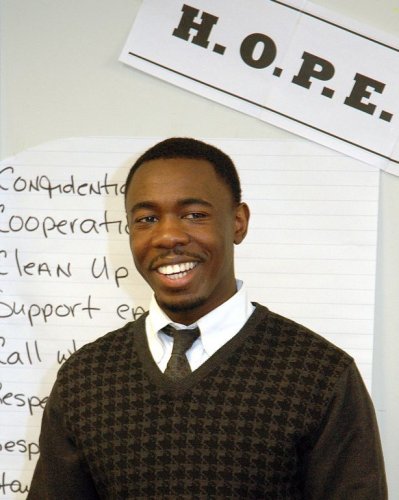 Haiti1Stop had the pleasure of connecting with the Founder/Executive Director of CapraCare, Jean Pierre-Louis, on their work at Fonfrede. Mr. Jean Pierre-Louis has been instrumental in putting CapraCare on the front line and has an endearing passion for the organization that he founded in 2009. After our initial contact with CapraCare, we felt compelled to feature this incredible organization in a Q&A format. Their exemplary work reflects how one person with a vision can make a difference through determination and hard work. Haiti1Stop would recommend everyone to read about CapraCare and support them either through monetary donations or volunteerism.
Haiti1Stop had the pleasure of connecting with the Founder/Executive Director of CapraCare, Jean Pierre-Louis, on their work at Fonfrede. Mr. Jean Pierre-Louis has been instrumental in putting CapraCare on the front line and has an endearing passion for the organization that he founded in 2009. After our initial contact with CapraCare, we felt compelled to feature this incredible organization in a Q&A format. Their exemplary work reflects how one person with a vision can make a difference through determination and hard work. Haiti1Stop would recommend everyone to read about CapraCare and support them either through monetary donations or volunteerism.
Below is a glance at CapraCare’s initiatives and positive work in Fonfrede. We will feature more of CapraCare in the future as we see this organization evolving.
Haiti1Stop: Does CapraCare intend to open a clinic in Fonfrede in the long run?
Jean Pierre: Yes, CapraCare plans to open a health clinic in Fonfrede that will be well equipped with a medical team that will provide health services such as physical examinations, dental, HIV testing and support, and more comprehensive health services to the community.
Haiti1Stop: Does the organization plan to extend its services to other areas of Les Cayes or in Haiti?
Jean Pierre: Yes, CapraCare is strategically planning to have our program implemented in as many communities throughout Haiti as resources allowed.
Haiti1Stop: How many individuals does CapraCare serve in a year with the types of services provided?
Jean Pierre: We provide services to approximately 1,500 people annually.
Haiti1Stop: How has the community responded to the health education and the psychological support specifically post earthquake?
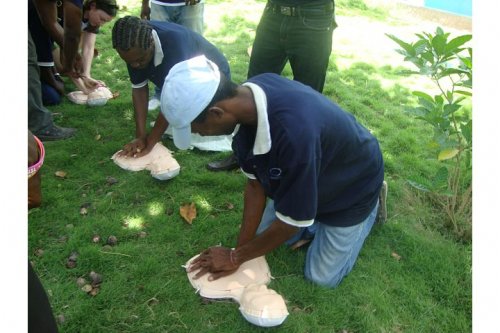 CPR Workshop |
Jean Pierre: The community has responded very well to our health education program. We find our participants are eager to learn about preventive health issues. They have been well attended with an average of 25-30 participants at the health education workshops and 125 – 150 participants at the community health fairs. We are working very hard to provide these services at the highest quality, enjoyable, and meaningful with the hope to receive support to conduct them at a higher frequency.
Haiti1Stop: Are people of Fonfrede open to the psychosocial program and does CapraCare have enough volunteers in this field?
Jean Pierre: At CapraCare, we believe there is no health without mental as a result it’s very important to provide mental health support. Prior to the Haiti earthquake, we found that people were not so receptive and didn’t understand the importance of mental health support as they kept referring to the stigmas associated with such service. However, immediately after the Haiti earthquake, it became the #1 service people were asking to receive from our program. And, since a lot of people still believe in some of the negative stigmas associated with mental health, CapraCare is using a community model and taking a traditional healing approach to provide such services; in addition, since the infrastructure of neither Haiti nor CapraCare has the capacity to support the more advance traditional western interventions such as psychotherapy, pharmacotherapy, etc, we believe our strategy will provide equally beneficial outcomes.
Haiti1Stop: Would you share with us which group (adults vs. children vs. elderly) has been more receptive to the mental health program?
Jean Pierre: The adults, children, and elderly all have been equally receptive at participating in our mental health supported services. We believe this because our program has been very creative and innovative with identifying activities to keep each group engaged. However, the children by far is a much bigger challenge to service since they require a lot more resources, monitoring, and closer supervision.
Haiti1Stop: What has been your biggest challenge in:
a) Starting such an endeavor in Fonfrede?
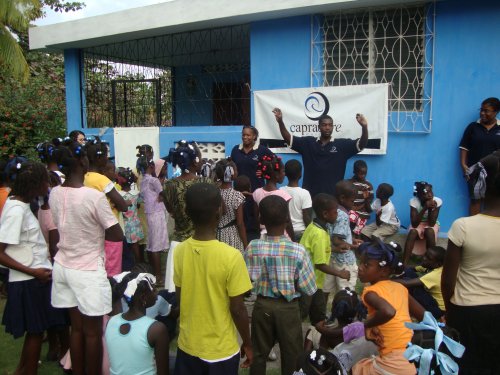 Jean Pierre: Fortunately for me, the challenges were not very difficult I was always connected to the community. As a child, I was very active in my community resulting in me becoming a very popular kid throughout the town. So, at 9 years old I was heartbroken after leaving Haiti, as I did not want to leave my community behind. And, since I couldn’t take my entire community with me, I always wanted to stay connected as I knew that connection would become extremely important for me to one day return with help to make life better for all of them.
Jean Pierre: Fortunately for me, the challenges were not very difficult I was always connected to the community. As a child, I was very active in my community resulting in me becoming a very popular kid throughout the town. So, at 9 years old I was heartbroken after leaving Haiti, as I did not want to leave my community behind. And, since I couldn’t take my entire community with me, I always wanted to stay connected as I knew that connection would become extremely important for me to one day return with help to make life better for all of them.
Haiti1Stop: b) Implementing the programs in the community of Fonfrede?
Jean Pierre: The community of Fonfrede embraces CapraCare as they know this is one of their own bringing help with no hidden motives or agenda. They trust CapraCare efforts and are very proud to be involved hands-on in its daily operation. So, implementing CapraCare’s programs is a matter of having the ability to continue receiving resources and support from caring individuals, courageous friends, and Haitian Diasporas community living abroad as the local community does not have the means to financially support CapraCare efforts.
Haiti1Stop: Is there a protocol to follow to become a CapraCare volunteer?
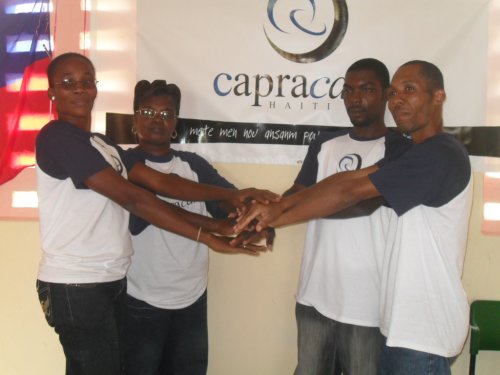 Jean Pierre: The protocol to becoming a CapraCare volunteer is simple. The person needs to express interest by informing us via email at info@capracare.org.
Jean Pierre: The protocol to becoming a CapraCare volunteer is simple. The person needs to express interest by informing us via email at info@capracare.org.
While we are eager to find volunteer help, we are careful when accepting the services you offer. If you contact CapraCare to offer to volunteer your time, you may be asked to come in for an interview, fill out a volunteer application, or describe your qualifications and your background just as you would at an interview for a paying job. It is in the organization’s interest and more beneficial to the people it serves to make certain you have the skills needed, that you are truly committed to doing the work, and that your interests match those of CapraCare.
We also offer virtual volunteering. If you have computer access and the necessary skills, we now offer the opportunity to do volunteer work over the computer. This might take the form of working on our website, multi-media, health curriculums, marketing, social networks, newsletter, translation, etc. This sort of volunteering might be well suited to you if you have limited time, no transportation, or a physical disability that precludes you from getting about freely. We work with college students as interns the same way.
Haiti1Stop: What is the minimum hours of commitment do you accept for the virtual volunteering? Again, anyone interested in participating should send an email to info@capracare.org?
Jean Pierre: We normally ask a minimum of six months commitment or we quantify the deliverable for the volunteer. For example, a person may volunteer 5+ hours a week; or the persons is a trainer and/or curriculum developer and is willing to provide CapraCare with two or three workshops. We try to be very flexible.
Yes, the first step is informing us that they are interested via email at info@capracare.org.
Haiti1Stop: What are CapraCare’s current needs?
Jean Pierre: CapraCare needs professionals to render their pro-bono services in the following areas: Grant writing, Marketing, Fundraising, Resource Developing, and Haitian Creole Translating. These needs will be ongoing as CapraCare continues to grow and expand to other parts of Haiti.
To contact Jean Pierre-Louis or send an inquiry to CapraCare for donations or volunteerism, send your inquiries to: info@capracare.org.
CapraCare is also listed under our Healthcare Education, Local/NGO, and Volunteer sections
Haiti1Stop extends their appreciation to Mr. Jean Pierre-Louis for providing us with pictures of CapraCare’s workshops as well as their partners’ contact information in Fonfrede. CapraCare has an upcoming fundraising event for Haiti on January 19th 2012.
Monument Commémoratif pour les Familles Haïtiennes à Queens / Pwojè Moniman pou Fanmi Ayisyen yo ki nan Queens
Monument Commémoratif pour les Familles Haïtiennes à Queens
Des milliers de nos proches parents ont perdu leurs vies durant la tragédie du tremblement de terre de 2010 en Haïti. Cela fait presque 2 ans, et toujours le chagrin et la douleur sont engravés dans nos cœurs. Certaines familles ont eu l’occasion de donner une sépulture décente à leurs proches mais beauoup d’autres n’ont pas été aussi chanceuses. De nombreux corps n’ont jamais été trouvés et d’autres ont été placés dans un cimetière massif. Cette dernière situation est l’une des pires craintes qui pouvait arriver à quelqu’un. Il est très pénible de vivre avec le fait que vous avez perdu un être cher et le fait que vous n’êtes pas capable de donner un dernier enterrement ou un dernier rituel à vos proches.
Maple Grove Cemetery à Kew Gardens, Queens aimerait ériger un Monument commémoratif pour les familles haïtiennes pour commémorer la vie de leurs proches qui ont péri lors du séisme, et qui n’ont pas eu de sépulture appropriée en Haïti ou aux Etats-Unis. Le cimetière a commencé de travailler sur ce projet depuis 2010. Maple Grove Cemetery aimerait démarrer le projet le plus vite que possible. Ils ont déjà retenu un architecte haïtien pour concevoir le plan du monument dès qu’ils recrutent plus de familles. Le monument commémoratif sera un lieu d’honorer votre bien-aimé en ayant leur nom gravé sur le monument, à visiter quand vous le voulez et à méditer. En plus, ce monument sera maintenu pour toute les futures générations.
Vous n’avez pas a vous préoccuper ni de paiement et ni de statut légal aux Etats-Unis, parce que le but de Maple Grove Cemetery, est de vous donner, la famille haïtienne, la possibilité d’avoir le nom de votre bien-aimé gravé dans un lieu de repos.
Haiti1Stop aimerait que les résidents à Queens qui veulent amples informations sur ce projet, nous contacte à info@haiti1stop.com et nous vous ferons parvenir les coordonnées complètes de la personne dont vous avez besoin de parler à Maple Grove Cemetery.
Pwojè Moniman pou Fanmi Ayisyen yo ki nan Queens
Milye frè ak sè nou pèdi lavi yo nan tranbleman 2010 ki pase Ayiti. Sa fè preske 2 zan nou toujou gen lapenn ak doulè nan kè nou. Gen fanmi ki te gen opòtinite pou yo antere fanmi yo, men gen lòt ki pa jwen chans sa. Yo te swa pa jwenn ko fanmi yo, ou bien yo te deja mete yo no nan simityè en mas. Se sitiyasyon ki pi mal la ki te ka rive yon moun ki soufri yon pèt si trajik. Li trè difisil pou viv ak lefèt ke ou pèdi yon moun ou renmen ak lefèt ke ou pa kapab bay fanmi ou on dènye antèman.
Simityè Maple Grove nan Kew Gardens, Queens vle bay chak fanmi ayisyen yo nan Queens yon moniman pou komemore lavi moun ke yo pèdi, ki pa te gen okenn antèman ni an Ayiti oswa nan Etazini. Simityè Maple Grove ap travay sou pwojè sa-a depi 2010. Yo gen yon achitèk ayisyen nan konsepsyon moniman an, epi yo pare pou yo fè moniman an pi vit ke posib. Simityè an vle plis fanmi patisipe. Moniman ap se yon kote yo pral ekri non moun nou renmen yo, e fanmi yo ka vizite nenpòt lè yo vle pou yo lapriyè oswa fe refleksyon. Sa ki pi enpòtan, moniman an pral kanpe pou anpil jenerasyon kap vini yo.
Fanmi ayisyen pa bezwen peye pou anyen, ak yo pa dwe konsène yo sou estati legal yo nan peyi Etazini. Simityè a sèlman vle bay fanmi ayisyen yo opòtinite gen non moun ke yo pedi grave sou moniman an.
Haiti1Stop ankouraje nenpòt moun ki abite nan Queens ki vle fè pati nan pwojè sa-a pou yo kontakte info@haiti1stop.com pou nou fè rive enfòmasyon konplè sou moun ou bezwen pale lan simityè Maple Grove.
Haiti1Stop Interviews Kristen Hertzog
HCN Online Education in Haiti
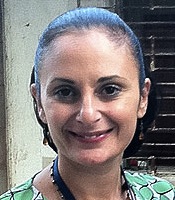 The Executive Director of the Haitian Connection Network (HCN), Kristen Hertzog, opens up about her non-profit organization, her love for Haiti, her family life, her passion and devotion to education, and her student sponsorship program. Kristen’s mission is to empower Haitian students and she is determined to provide them with the tools necessary for a great online education.
The Executive Director of the Haitian Connection Network (HCN), Kristen Hertzog, opens up about her non-profit organization, her love for Haiti, her family life, her passion and devotion to education, and her student sponsorship program. Kristen’s mission is to empower Haitian students and she is determined to provide them with the tools necessary for a great online education.
The conversation took place via Skype on Nov. 5th, 2011 at 1pm E.T. Our co-founder France had a wonderful time with Kristen and was fortunate to meet her lovely adopted daughter from Haiti. Please read on to learn how you can make a difference in a student’s life.
Haiti1Stop: When did you first learn about Haiti?
Kristen: I went to Haiti when I was 16 years old on a 10-day trip with a local church in my area. I am Italian-American and I knew nothing about Haiti. I thought, “This would be cool!”. So while I was in Cite-Soleil, a lady handed me her baby and ran away. I remember staring at this little girl in my arms. Her eyes were as big as life and she didn’t know what end was up. And I started screaming for this woman to take the baby back, saying “Come back! Come back”. Long story short, a member of the team found her, brought her to me, and I handed her the baby and she looked at me and said “I knew that you could give my daughter a better life in America”. And it felt like the clouds had parted, and I felt like God spoke to me and said “Kristen, one day, you are going to adopt a little Haitian girl”. And that stuck with me! Sixteen, what did I know? I cared about pimples and boys, not about adopting Haitian children! But that was so clear in my mind and sure enough, years and years later, I got married, and my husband and I decided to adopt a beautiful little Haitian girl. That is something that has been sort of a self-fulfilling prophecy, if you will in my life. So, there’s always been a connection to Haiti on a very deep level after that.
But, really, my yearly trips to Haiti didn’t begin until in 1999, when I was an adult. And I started leading short-term mission teams down to Haiti with a friend of mine. It was there that I met a young man by the name of Esperando. 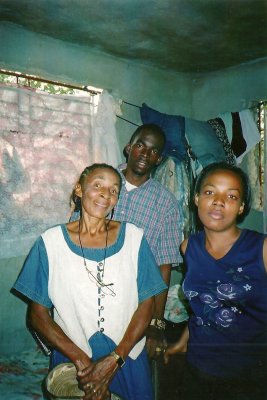 We were teaching conversational English at a school and this young man came up to me, and said “I need to quit High School this week, because I can’t afford to come here”. And with that, he took the button off of his shirt, rolled up his shirt, and he had all of these third degree burns, all over his arms. I said, “Oh my God, what happened to you?” He said “I have been working the graveyard shift at a plastics company and some of the plastic had spilled on my arm, and I was fired. And because of that, I can no longer afford to go to High School, “Is there anything you can do to help me?”. And myself and the team, we rounded up our souvenir money and we were able to send him the remainder of his High School education.
We were teaching conversational English at a school and this young man came up to me, and said “I need to quit High School this week, because I can’t afford to come here”. And with that, he took the button off of his shirt, rolled up his shirt, and he had all of these third degree burns, all over his arms. I said, “Oh my God, what happened to you?” He said “I have been working the graveyard shift at a plastics company and some of the plastic had spilled on my arm, and I was fired. And because of that, I can no longer afford to go to High School, “Is there anything you can do to help me?”. And myself and the team, we rounded up our souvenir money and we were able to send him the remainder of his High School education. 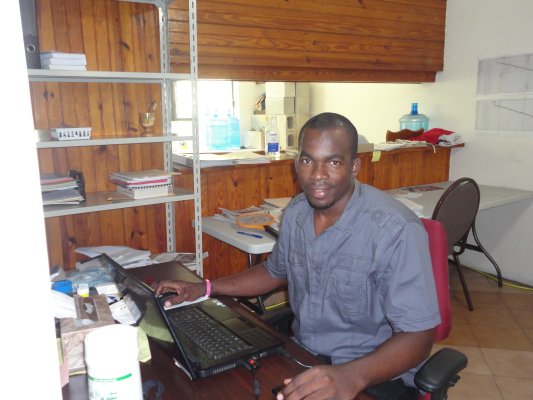 Since then, we developed a relationship, a friendship if you will, and after he graduated from High School, he asked me if we would send him to a computer college for two years. And, we were able to secure the funding for that. So long story short, 2004, this guy has barely eked out a High School diploma, he lives in a two-room shack, eats one meal a day, and has no plan B or A. By 2010, because of that two-year computer degree, this guy is now married, has two children, has his own home, is sending his brother to High School, helping his ailing parents, and is running a leading NGO in Haiti. That put a fire under my butt, and made me say “If there is a kid like that, there’s got to be more of them”.
Since then, we developed a relationship, a friendship if you will, and after he graduated from High School, he asked me if we would send him to a computer college for two years. And, we were able to secure the funding for that. So long story short, 2004, this guy has barely eked out a High School diploma, he lives in a two-room shack, eats one meal a day, and has no plan B or A. By 2010, because of that two-year computer degree, this guy is now married, has two children, has his own home, is sending his brother to High School, helping his ailing parents, and is running a leading NGO in Haiti. That put a fire under my butt, and made me say “If there is a kid like that, there’s got to be more of them”.
Haiti1Stop: So, in the span of 2004 to now, when did HCN get started?
Kristen: We became an official non-profit organization in 2009. And after that, we were able to secure a University partner to assist us in our quest. So, the way to think about HCN is HCN provides the infrastructure for online learning. We are not a University and we are not a school. We provide everything that a needy student needs to connect. For example, I had a meeting with Wyclef Jean about this very issue. And we were talking about the fact that having one laptop per child is a grand idea in a regular wealthy country. In Haiti, it’s like handing a kid a twelve pound rock. He can’t charge it, he doesn’t know how to fix it, and he doesn’t have internet access. So the laptop is pointless thing to give. The HCN Student Computer Center provides the energy, the backup power, the technical assistance and even one meal per student per day. So that they can be eating and able to concentrate on their online studies while they’re in school. So it provides all those things to make that education happen.
Haiti1Stop: How early do people have to apply to be part of the program?
Kristen: They have to have their High School diploma in hand. The current documentation that is necessary to be considered for HCN Student Computer Center and its partner, University of the People, are that students must read and understand fluent English. The reason why is because our University ally is in Pasadena, California. And therefore, because it is an American based non-profit tuition free education system, it is in English. Secondly, it must be notarized, legalized and translated into the English language as well as their High School transcript. From a documentation standpoint, those are the things that we require before we can go any further in the application or admission process.
HCN looks specifically for other things as well for acceptance into the Computer Center. We look for motivated kids, driven people, people who have had possibly very little assistance in any way in their lives, because of their home lives or financial situation. We look for those kids that we can say in our minds: “where are those kids going to be five years down the road, ten years down the road or is this kid going to show up for school, or is he going to get tired trying to find a tap-tap every day?” So it is a sacrifice on the part of the student, many students, just to get to the learning center. We definitely look for those kids that we know they are going to follow through. It’s not enough to say you want an education; it’s not enough to say you want a better life. You have to do what you have to do in order to make that occur, and I feel very passionately about that.
Haiti1Stop: HCN’s curriculum is Business Administration and Computer Science. Why did you pick these two as your curriculum? (Both of them are two-year associate degrees through the University of the People)
Kristen: Well, several reasons. Number one, they are currently the only ones that the University of the People offers our Haitian students tuition free at this time. And secondly, in my experience with local organizations and businesses on the ground in Haiti, these are two fields that are desperately needed in Haiti. So, I think of it as “HCN is building leaders and building techies”. And as Haiti rebuilds from the earthquake, these are two fields that are critical for success in Haiti’s employment, and economy and the financial sector.
Haiti1Stop: Walk me through a typical day for a student at HCN.
Kristen: Once a student is accepted into the University of the People, based upon availability, students can choose to come Monday through Friday for a morning shift or an afternoon shift. They must be on time, they must be on time, they must be on time! We have students who are coming from Carrefour and areas two hours away, they must be on time as well, so that’s critical. Students get four hours per day to be online, on an HCN laptop with printer, scanner access as needed. 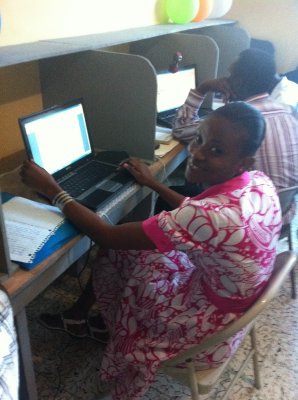 And their responsibility is really self-motivated because every student in the school could be in a slightly different place in their education, based upon where they started. Then at 12 noon, the students will receive one meal per school day. So the morning shift is leaving and they get to eat, the afternoon shift is coming in and they get to eat so the students can have fellowship together, and talk with each other, and enjoy the meal, and continue on in their day. So it is definitely, a self motivated program, there is no one standing over you, making sure you are doing every last little thing. You must be driven to do it yourself or else you will not succeed.
And their responsibility is really self-motivated because every student in the school could be in a slightly different place in their education, based upon where they started. Then at 12 noon, the students will receive one meal per school day. So the morning shift is leaving and they get to eat, the afternoon shift is coming in and they get to eat so the students can have fellowship together, and talk with each other, and enjoy the meal, and continue on in their day. So it is definitely, a self motivated program, there is no one standing over you, making sure you are doing every last little thing. You must be driven to do it yourself or else you will not succeed.
The way that the University of the People is set up is that there is a lot of social media via text that happens throughout the course of the school day. So while a student might be in Haiti studying, perhaps the 20 people in his classroom virtually might be from all over the globe. It is very exciting for our students that the online learning experience has opened up their eyes to the way other people do [life] in other countries and how important and how global the world has become.
In addition to that, there are sometimes meetings with our administration on the ground in Haiti. We have workshops where American business people will come and talk to our students about various fields of study. We’ve had workshops on resume writing and interview skills. The students get to learn how to respond and relate to people and how to relate to someone who owns a company in Haiti where perhaps, they’ve never talked to anybody in their life who owns a business. The agenda is to really empower the students that they are an equal to the people. We try to give a very well rounded approach to the careers the students will eventually have.
Haiti1Stop: How many staff members do you have in Haiti?
Kristen: We have four full-time members and we have one lady who does the cooking for us. So, the Haitian Connection Network, the infrastructure is in place for additional students. We have someone who does recruitment, someone who does administration and we have technical assistance. For example, many of our students had never turned on a laptop before. You can’t expect them to go online and have no problem with learning the technology and having a learning curve. So we decided that a full time technical assistant was necessary. We have live security as well as computerized security. We have been completely, in my opinion, setup for this to grow, and that is the goal to see the organization grow and for more students able to come.
Haiti1Stop: Is there an opportunity for educators around the world willing to donate their time to HCN?
Kristen: At this time, no. Because University of the People is comprised of professors and folks who have pretty high academic standards. However, HCN is open to discussing with people who have an interest in possibly helping out educationally in other ways. For example, we are planning a trip in the Spring where educators from around the globe can come to HCN and do on the ground training with students. So it would give folks an opportunity to see what is really like down there, and who you are really affecting as well as to bring education as a more hands-on practical approach as opposed to online. People are more than willing to contact me about that at info@haitianconnectionnetwork.org.
Haiti1Stop: Do you have an ESL program for the students who do not know how to speak English?
Kristen: That is such an awesome question, because I can’t tell you how proud I am of our current students. I received two emails last week from our students who are volunteering to start ESL classes for the neighborhood. It shows that full self-motivation thing that I just get excited about. It’s one thing for things to be generated from the center, but it’s another thing for Haitians to be taking responsibility for their own future as well. I couldn’t be more thrilled. They are looking at doing two classes starting in the next few months, an advanced and intermediate English class. So, that will help those future students to get their English skills together, so when the time comes, they are ready and prepared with their High School diploma to go into the next step with us. We are also in negotiation with an online ESL training program. We may possibly be in the future opening our doors to additional ESL classes that will be virtual, in addition to the ESL classes the students want to put on.
Haiti1Stop: Where there any obstacles in building a partnership with the University of the People?
Kristen: Not really. I am very fortunate that the President of the University of the People, Mr Shai Reshef, and I were really on the same page with what we wanted to see happen with Haitian education. And last November 2010, a year ago, he flew in from Tel Aviv, Israel, and I flew in from Philadelphia and we met in Haiti with all of the students together. And, that was a wonderful experience for he and for myself. Some of the videos of our trip are on our website at www.haitianconnectionnetwork.org. You can actually see Mr. Reshef and myself, visiting the students’ home and talk to the students and it was really an inspiring time for both of us to have that very personal approach with the kids we were helping.
Haiti1Stop: Since HCN’s inception, what has been your graduation rate?
Kristen: That’s a grand question. We just started last year, last November with the two-year associate degree program through our partner, so we don’t have any graduates as of the moment because they are halfway through their education. However, we did pilot the HCN educational program in 2004 with 7 students. And all of them, we are very thrilled to say, are currently employed. I believe that education is a means to employment. I think that is a very mind bending idea to some. In my experience, education is revered in Haiti. For those potential students out there, where if someone were to ask you five years down the road, “where do you want to be”, and you say I still want to be in school, that’s a struggle. School, upon school, upon school is great, but it does not feed your stomach; education and employment does. So, we really search out for those students who look at themselves and say, I understand education is means to employment. And that is where our past students have been as well as our current students, halfway through this program.
Haiti1Stop: Where have your graduates gone to work?
Kristen: We have one working for an international NGO, one who is teaching English classes at a school, another who works in data entry for a local bank and others work in translation or teaching type of jobs.
Haiti1Stop: The ratio of women in technology is low, even in the U.S. How does the ratio of women vs. men students compare in the HCN computer science classes?
Kristen: Loaded question. I currently have 20 students. And I believe 20% are women and we are dedicated to finding female students who can qualify. I for one, as a woman[who] is very passionate about this because essentially in Haiti, the percentage of High School graduates, male to female is significantly lower. So that is my passion and my goal to see a 50-50 percentage rate male to female at HCN.
Haiti1Stop: Tell me more about your feeding program at HCN.
Kristen: We were finding that many of our students because of their economic situation were coming to school with headaches, and really struggling to focus and concentrate. And through a very generous donor, we have been able to provide this feeding program: one meal per day per student. I do want to emphasize that this agreement was for a year, and that year will end at the end of February 2012. For those who might be interested in helping to support us to continue that feeding program, they can contact us at www.haitianconnectionnetwork.org.
Haiti1Stop: In addition to that, what are HCN’s needs?
Kristen: The tuition is free; I want to make that real clear. University of the People is a tuition-free online University. Any Haitian, any Chinese person, any African person, any American, if they qualify, they can go tuition-free to University of the People. In Haiti, having those internet options, energy option, technical assistance, that’s where we come in and we are the vehicle to get the student that free education. Our costs per student are $1,600 US dollars per year and that includes all of the infrastructure costs necessary to get the kids the education through University of the People or any educational online program out there.
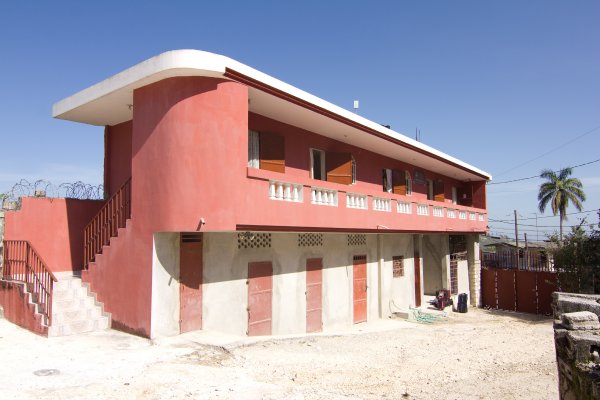 Currently, we have about 60 students pre-qualified and on a waiting list. What that means is we need the funding now to get them into the program. So, really, there are two kinds of folks that should really be hearing this message. The first one is that potential student who knows that they can afford through some means, whether through family, friends, or a job to afford the $1,600 US dollars per year, for a two-year associate degree. The other person is the potential donor who is listening and going, “My God, this has such long term benefits, I want to help fund a waiting student”. Those folks also should know that there is no waste in this program. That $1,600 is just a vehicle to get those students what they need so we need financial assistance, plain and simple. We need help and need people who believe in education, believe in Haiti, believe that education is the means to gainful employment — those are the people we want to talk to as soon as possible.
Currently, we have about 60 students pre-qualified and on a waiting list. What that means is we need the funding now to get them into the program. So, really, there are two kinds of folks that should really be hearing this message. The first one is that potential student who knows that they can afford through some means, whether through family, friends, or a job to afford the $1,600 US dollars per year, for a two-year associate degree. The other person is the potential donor who is listening and going, “My God, this has such long term benefits, I want to help fund a waiting student”. Those folks also should know that there is no waste in this program. That $1,600 is just a vehicle to get those students what they need so we need financial assistance, plain and simple. We need help and need people who believe in education, believe in Haiti, believe that education is the means to gainful employment — those are the people we want to talk to as soon as possible.
Haiti1Stop: What have been your biggest struggles in doing what you do with HCN besides financial needs?
Kristen: I think self-empowerment has been a challenge. Because so many Haitians have been through so much in the last few years, and historically, it’s unprecedented, the historical challenges that Haiti has had among so many other countries. I think that there is a sense of feeling beat down, and one of the things that I feel very passionate about as the Executive Director of HCN is to empower the students personally. It is a mind shift for many students who come from economically disadvantaged homes who have been told they’ll never go to college, have never dreamed of being employed gainfully, and actually getting a steady paycheck. They know no one else who’s ever done that.
The mind shift is very challenging and it is something that I personally feel passionate about. I had an interesting situation happen recently. I was down in Haiti, teaching a how to interview workshop with our students, and I asked one of the students to stand up, and pretend that I am a wealthy employer, and they are coming in for a job. And this brand new student who barely knew I was, stood up and very shakily put his hand out to shake my hand and looked down, he was afraid to look me in the eye. And I made him look at me. And I said to him, you are worth it, you are worth this job, and don’t let any history, don’t let any family, don’t let anybody tell you differently. The fact that you have gotten this far proves that you are worthy. This young man got a little emotional about that, and I think that struck a chord. And as a parent of a Haitian child, as well as biological child, I want my kids to feel empowered. I want them to feel like they can do anything and I want my Haitian students to feel the same way.
Haiti1Stop: As far as growth, would you like to expand HCN outside of Port-au-Prince?
Kristen: Oh my word, yes. I would love to have multiple centers in all of Haiti, in every region and city. Within the next five years, I would like to have several learning centers throughout the country. So, we are excited about where this can go. We are still in the baby stages so we have to make the funding work before we can get to that stage.
Haiti1Stop: How can someone sponsor a student at HCN?
Kristen: We have something going on right now called four for forty, [which means] 4 people committing $40 dollars a month for a year, equals one waiting student’s tuition. My husband and I went out for dinner the other night, it was over $40 dollars, just to go to a middle of the road restaurant and have dinner. If there were four people out there, who said, you know what, I can eat at home one night a month, and have 40 dollars to give towards a waiting student, that would be great. That’s the first way that someone can tangibly make a difference in the life of one of these students.
The students are ready to go, they are waiting for the phone call to say we have the funding for you and can you start on XYZ date. That’s the most tangible way that you can help out. We are a 501c3 and you can get your tax write-off. This is something that is critical because it has longevity and sustainability. We’d also love to talk to in person or on video Skype to see how people might be able to help HCN. Giving cannot be easier, on the HCN website, you can give right online through Egiving. You can do automatic deductions from your credit, checking or debit card every month. It’s a one- time setup, and every month $40 are deducted from your account, and that money goes directly to the Haitian Connection Network Computer Center for the new student.
Haiti1Stop: What is the last thing you want to leave us with?
Kristen: Right now, 20 kids are enrolled and 60 are on a waiting list. HCN is set up for additional students. We have the laptops, space, security, administration, technical support. What is missing is $1,600 per year per student for a two-year commitment. We need funds to support [our] infrastructure to support the students’ education.
To contact Kristen Hertzog on how to contribute to HCN’s feeding program or to sponsor a student, please forward your inquiries to: info@haitianconnectionnetwork.org.
HCN is also listed under our Education section and Sponsor a child section For information on the University of the People, click here.
Memorial Monument Project for the Haitian families in Queens
Thousands of our loved ones lost their lives during the 2010 Haiti earthquake tragedy. It has been almost 2 years, and still the grief, the pain and sorrow are vivid in our hearts. Some families had the opportunity to give a proper burial to their loved ones and some other families were not as fortunate to do so. Many of the bodies were either never found or have been placed in a mass graveyard. The latter is one of the worst fears for anyone who has suffered a tragic loss. It is very painful to live with the fact that you lost a loved one and you are unable to say one last goodbye or do the last rituals.
Maple Grove Cemetery in Kew Gardens, Queens is reaching out to the Queens Haitian families to establish a Memorial Monument to commemorate the lives of their loved ones who perished during the earthquake, and had no proper burial in Haiti or in the United States. Maple Grove Cemetery has been working on this project since 2010. They have retained a Haitian architect to design the monument and are ready to make that happen as soon as they recruit more families. The memorial monument will be a place to honor your loved one by having their name engraved onto the monument, to visit anytime you want and meditate. Most importantly, the monument will stand erect for many generations to come.
There are no donations required and no need to pay for anything. There is no need to be concerned about your legal status in the USA because their goal is to give YOU, the Haitian family, the opportunity to have the name of your loved one engraved in a restful place.
Haiti1Stop urges anyone residing in Queens wanting to be part of this Memorial project to contact us and we will forward the full contact information of the person you need to speak to at Maple Grove Cemetery. They would like to start the Project ASAP and want more people to participate in.
Please if you need further information about the cemetery doing this wonderful project and obtaining an application form, write us at info@haiti1stop.com and we will address you to the right person.
Maple Grove Cemetery is already the restful place for many Haitian families pre-and post earthquake.
Quelle est votre valeur? (En mémoire de Sonia Pierre)
La valeur d’un homme tient dans sa capacité à donner et non à recevoir.
– Albert Einstein
Quelle est votre contribution en Haïti? Lorsque nous parlons de contribution, nous ne parlons pas seulement de choses matérielles. Une contribution peut etre aussi la valeur de caractère que vous apportez dans le monde.
Contribuez-vous un bon service dans le monde? Traitez-vous les gens avec respect et honnêteté? Etes-vous une personne qui tient son mot? Toutes ces choses peuvent affecter la reputation d’une personne et peuvent pousser des gens a vous juger dependant de vos actions. Votre réputation est la seule chose que vous pouvez donner sans dépenser quoi que ce soit. Votre réputation est votre richesse.
Pour sauvegarder cette richesse, donnez le meilleur de vous-même dans tout ce que vous faites. Si vous avez un travail, faites- le bien. Si vous faites une promesse a quelqu’un, tenez -la. Les personnes les plus réussies valorisent les autres et tiennent leur parole, et particulierement démontrent l’intégrité. Le respect est accordé à ceux qui mènent une vie digne de respect – c’est à dire le respect se gagne, et nous devons agir honorablement en vue de le recevoir des autres.
Alors, aujourd’hui, Haiti1Stop vous demande, quelle est votre valeur, et que comptez-vous donner pour l’augmenter?
En mémoire de Sonia Pierre, militante des droits humains qui, depuis son enfance, combat la discrimination et le mauvais traitement des Dominicains d’origine Haïtienne.
Journée Mondiale de SIDA ! Jou Mondyal SIDA!
Journée Mondiale de SIDA !
LE SIDA a ravagé des milliers de vies durant ces dernières années, spécialement dans la communauté Noire. L’un des moyens de prévenir le SIDA est d’utiliser un préservatif.
Si vous ne savez pas votre statut, allez prendre un test de SIDA et demandez votre partenaire de prendre le test aussi. Que vous êtes célibataire, marrie, riche ou pauvre, de différentes cultures ou nations, le SIDA ne discrimine pas.
Haiti1Stop aimerait que vous exhortez de l’intelligence dans vos choix et rapports sexuels en vous aimant d’abord. Lorsque vous vous aimez, vous avez le pouvoir pour de ne pas devenir une statistique mondiale.
Renseignez-vous! Obtenez tous les faits!
Trouver un emplacement de test en visitant les liens ci-dessous:
- Free and Confidential Clinics for testing in all 5 Boroughs
- World Aids Day
- AIDS
- World AIDS Day 2011
- UNAIDS – World AIDS Report 2011 Anglais or Francais
- USAID- Haiti Report 2010
- NYC Events
Jou Mondyal SIDA!
SIDA pran dè milye de moun espesyalman nan kominote Nwa. Nou ka anpeche lè. Sèvi avèk yon kapòt ak pratike fason sen e sòf pou fè sèks.
Tanpri, al pran yon tès SIDA epi mande patnè ou pou pran tès yo tou. Si ou selibatè, marye, masisi, dwat, rich oswa pòv, nan diferan kilti yo oswa lòt nasyon, SIDA pa fè diskriminasyon.
Haiti1Stop ankouraje tout moun al pran tès SIDA. Fo ke nou renmen tèt ou anvan tou. Lè ou renmen tèt ou, ou gen pouvwa pou PA tonbe nan estatistik mondyal SIDA a.
Edike tèt ou! Jwenn enfòmasyon yo!
Jwenn yon kote pou tès SIDA, vizite lyen ki anba la:
- Free and Confidential Clinics for testing in all 5 Boroughs
- World Aids Day
- AIDS
- World AIDS Day 2011
- UNAIDS – World AIDS Report 2011 Angle or Franse
- USAID- Haiti Report 2010
- NYC Events



